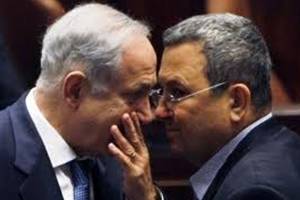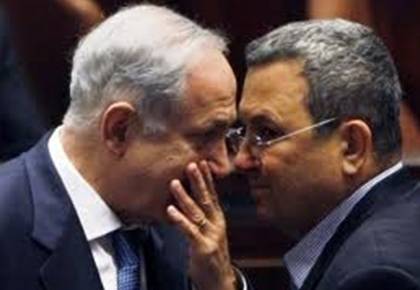
With the coming of autumn, doubts return. In another month, after the holidays, clouds will blanket the sky, and make it difficult for spy satellites and planes to see what is afoot down below. Whoever entertains the thought that an attack on Iran would deflect attention away from the Palestinian issue will have to wait until the skies clear again in April.

Netanyahu & Barak’s conspiracy
At first glance, the scenario seems deluded: Why would Israel, which is enveloped in the most severe strategic isolation it has faced since 1967, decide to engage in a war that would be liable to set the whole Middle East aflame? Yet the anticipated diplomatic stalemate, compounded by the sense of a thickening siege, could potentially prod the prime minister and the defense minister into seeking their own political resurrection in Iran. Anyone who has heard the description given by former Mossad chief Meir Dagan, regarding the intense responses stirred by the Iranian issue in recent years, can imagine that this scenario is not so far-fetched.
This would be the rationale: During the coming winter, centrifuges in Iran will produce close to a ton of enriched uranium, and Iran will relay this uranium product to its underground vault at Qom. There, beneath layers of stone, it would be very hard for an airstrike to derail the production process.
Until recently, Netanyahu and Barak’s rashness has been blocked by a wall of stiff opposition put up by the security apparatus. An “iron triangle” of Dagan, IDF Chief of Staff Gabi Ashkenazi and Shin Bet head Yuval Diskin stood steadfast, and opposed schemes to attack Iran. This opposition was joined by others in the inner cabinet – Dan Merido, Moshe Ya’alon, Benny Begin and even Avigdor Lieberman. During a moment of frustration caused by his inability to recruit support in the IDF for such an attack, Barak scolded officers in the General Staff, saying that with “such a caliber of officers, Israel would never have won the Six Day War.”
The State Comptroller Office’s report on the Ashkenazi replacement affair is likely to shed light on calculations that led to the unconsummated selection of Major General Yoav Galant. Benny Gantz hinted about these motivations before he was summoned to become Chief of Staff: “I refused to relinquish my principles in order to gain the post,” he said, hinting that Galant’s selection was influenced by his strategic positions.
Subsequently, the entire security corps has undergone a shuffle, and there are new heads of the IDF, Mossad and Shin Bet. These security chiefs are not just newly-appointed – none of them were first choices for their posts. At first glance, this fact would seem to free them from obligations to the politicians who selected them. The problem is that they appear not to have accumulated the self confidence necessary to confront and disagree with their political superiors.
Waiting on the horizon is another appointment fraught with strategic implications. In April Major General Ido Nehostan will end his term as head of the Israel Air Force. Major General Amir Eshel, head of the IDF planning division, is considered the front-runner for the appointment, but recent pressure has been leveled by the Prime Minister’s Office in favor of appointing Netanyahu’s military secretary, Yochanan Locker, to the post.
Both men would be worthy appointees, but some are concerned that support for Locker stems from the desire to appoint a figure whose strategic outlook is akin to that of Israel’s leading political officials. In contrast, Eshel has acquired a reputation as a figure who is not afraid to clash with his superiors.
Gantz favors Eshel for the job. Should anyone else get the appointment, it would indicate that the IDF Chief of Staff is not the person who makes decisions on top IDF appointments. Such a move would also demonstrate that the political leadership wants to reduce IDF opposition to its plans.
On the day he left his post, Dagan stated that “Israel should wage war only when a knife is at its neck, and is already cutting flesh.” Without belittling the severity of Iran’s nuclear threat, it still bears noting that the knife is not there yet.
The writer is Channel 10’s military affairs correspondent.
Published by Haaretz daily, 25/9/11


